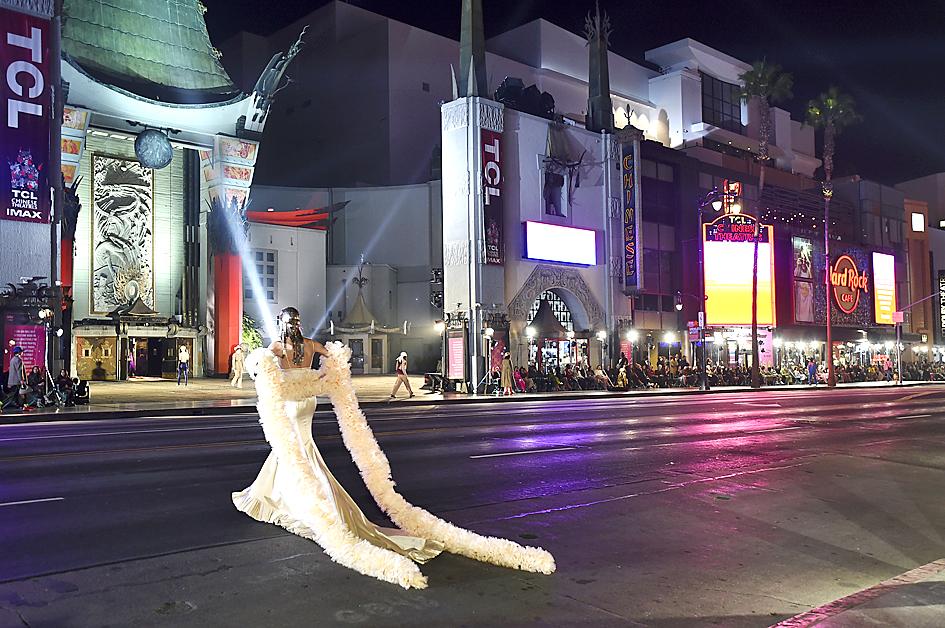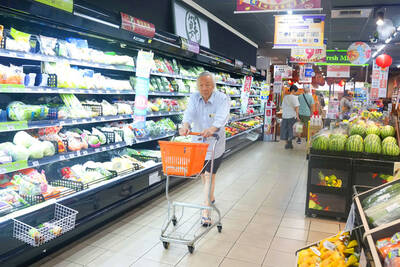Gucci sales for the fourth quarter last year surged past levels not seen since before the COVID-19 pandemic, as luxury group Kering SA’s biggest brand drew shoppers to its latest ready-to-wear collection.
Comparable revenue at Gucci rose 32 percent to 3.07 billion euros (US$3.49 billion) in the period from the year before, Paris-based Kering said in a statement yesterday. Analysts had expected growth of 18 percent.
The release in September last year of Gucci’s Aria collection helped generate buzz and sales, while the film House of Gucci, starring Lady Gaga, drew more attention to the brand.

Photo: AP
Led by CEO Marco Bizzarri and creative director Alessandro Michele, Gucci represents more than half of Kering’s revenue and close to three-quarters of recurring operating income.
The company was also helped by the performance of Yves Saint Laurent, where revenue soared 47 percent during the quarter, outperforming all the group’s other major brands.
“We are confident we will extend last year’s momentum in 2022 and in coming years,” Kering CEO Francois-Henri Pinault said in the statement.
Kering’s results provide the latest evidence that luxury sales are storming back from the pandemic, as well-heeled shoppers crowd back into stores in much of the world. Rival LVMH SE last month reported record annual revenue, helped by surging demand for Louis Vuitton bags and Tiffany rings.
Analysts are also focusing on pricing power at luxury houses, with Chanel and other names increasing prices, citing inflationary pressures. In a call with reporters, Kering chief financial officer Jean-Marc Duplaix said he expected more targeted price hikes for Gucci this year.
Kering’s recurring operating income for the year rose 60 percent to 5.02 billion euros, surpassing analysts’ 4.77 billion euros estimate.
Separately, online grocery services provider Ocado Group PLC said that it plans to extend its partnership with French firm Casino Guichard-Perrachon SA.
The companies signed a preliminary agreement to create a logistics joint venture in France that would be available for use by all grocery retailers in that market, Ocado said yesterday.
Casino will also use Ocado’s software to run its Monoprix in-store fulfillment operation, and Ocado is to integrate the Octopia online platform onto its systems.
Additional reporting by Bloomberg

On Tuesday, US President Donald Trump weighed in on a pressing national issue: The rebranding of a restaurant chain. Last week, Cracker Barrel, a Tennessee company whose nationwide locations lean heavily on a cozy, old-timey aesthetic — “rocking chairs on the porch, a warm fire in the hearth, peg games on the table” — announced it was updating its logo. Uncle Herschel, the man who once appeared next to the letters with a barrel, was gone. It sparked ire on the right, with Donald Trump Jr leading a charge against the rebranding: “WTF is wrong with Cracker Barrel?!” Later, Trump Sr weighed

SinoPac Financial Holdings Co (永豐金控) is weighing whether to add a life insurance business to its portfolio, but would tread cautiously after completing three acquisitions in quick succession, president Stanley Chu (朱士廷) said yesterday. “We are carefully considering whether life insurance should play a role in SinoPac’s business map,” Chu told reporters ahead of an earnings conference. “Our priority is to ensure the success of the deals we have already made, even though we are tracking some possible targets.” Local media have reported that Mercuries Life Insurance Co (三商美邦人壽), which is seeking buyers amid financial strains, has invited three financial

Artificial intelligence (AI) chip designer Cambricon Technologies Corp (寒武紀科技) plunged almost 9 percent after warning investors about a doubling in its share price over just a month, a record gain that helped fuel a US$1 trillion Chinese market rally. Cambricon triggered the selloff with a Thursday filing in which it dispelled talk about nonexistent products in the pipeline, reminded investors it labors under US sanctions, and stressed the difficulties of ascending the technology ladder. The Shanghai-listed company’s stock dived by the most since April in early yesterday trading, while the market stood largely unchanged. The litany of warnings underscores growing scrutiny of

OUTLOOK: Among the six sub-indices, only the stock market confidence sub-index rose due to strong equity performance and expectations of a US Federal Reserve rate cut Consumer confidence weakened further this month, sliding to its lowest level in two-and-a-half years as households grew increasingly uneasy about the economic outlook, job security and big-ticket spending, a survey by the National Central University showed yesterday. The consumer confidence index fell 1.07 points from last month to 63.31, the weakest number since May 2023, said the university’s Research Center for Taiwan Economic Development (RCTED), which conducts the monthly poll. “Although the Directorate-General of Budget, Accounting and Statistics recently increased Taiwan’s GDP growth forecast for this year to 4.45 percent, consumer sentiment tells a different story,” RCTED director Dachrahn Wu